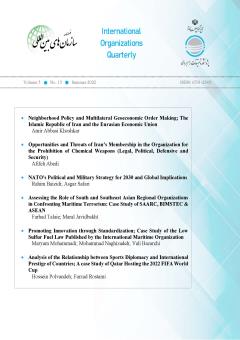-
-
-
Open Access Article
1 - Role of the Islamic Republic of Iran in Regional and International Institutions
Nasrin Mosaffa جواد امینمنصورWith the emergence of transnational and multilateral arrangements as major means of international negotiations and cooperation, questions have arisen about membership and participation in such arrangements: how to interact with them, and how to assess the impact of tran MoreWith the emergence of transnational and multilateral arrangements as major means of international negotiations and cooperation, questions have arisen about membership and participation in such arrangements: how to interact with them, and how to assess the impact of transnational institutions on national interests of member states. The present paper reviews the theoretical frameworks related to this issue before analyzing the role of the Islamic Republic of Iran in regional and international institutions and discussing the necessity of establishing a desirable and effective relations with international organizations. In doing this, the experience and scope of the presence and activities of the Islamic Republic of Iran in these organizations have been divided into three periods: from the victory of the Islamic Revolution to the end of the Iraq’s war against Iran in 1988; from 1989 to 2004, and from 2004 up to the present time. The paper enumerates common features of these three periods as well as their differences to delineate an overall picture of the Islamic Republic of Iran’s foreign policy with relation to regional and international institutions. Manuscript profile -
Open Access Article
2 - A Constructivist Study of International Organizations and Research Possibilities
Homeira MoshirzadehA Constructivist Study of International Organizations Homeira Moshirzadeh Associate Professor of International Relations, Faculty of Law and Political Science; Tehran University Theoretical attitudes to international organizations provide a basis for presenting s MoreA Constructivist Study of International Organizations Homeira Moshirzadeh Associate Professor of International Relations, Faculty of Law and Political Science; Tehran University Theoretical attitudes to international organizations provide a basis for presenting suitable questions and meaningful and systematic research. Constructivist approach as an analytical and conceptual framework, is a suitable basis for studying international organizations. This article while focusing on the theoretical foundations of constructivism and its research plan indicates that how this approach can guide research on international organizations. Constructivism can pave the way for further research on international organizations, given the issues such as interrelationship between agent and structure, inter subjectivity, relationship between rules and leadership, rule-setting, reproducing and changing rules, identity-building and organizational culture. This article shows that how some of these research possibilities have been exploited in research projects and what subjects could be explored in studying international organizations. Manuscript profile -
Open Access Article
3 - Iran's Approach to Non-Aligned Movement
hadi torki rsalan ghorbani torkneshinThe Islamic Republic of Iran can fulfill part of its foreign policy goals through interaction with international institutions. Perhaps, the Non- Aligned Movement (NAM) does not fit into an international organization, and its binding aspects are weak, but given the numbe MoreThe Islamic Republic of Iran can fulfill part of its foreign policy goals through interaction with international institutions. Perhaps, the Non- Aligned Movement (NAM) does not fit into an international organization, and its binding aspects are weak, but given the number of its members, its ideals and goals on the one hand, and the impact of international institutions in the modern age, on the other hand, it enjoys a wide range and many of its goals are in line with Iran's policies. This article by considering the theory of "neo-liberal institutionalism" which suggests that the international system is anarchic, states are effective and rational actors as well as international institutions have an independent identity, seeks to understand the nature of approach taken by Iran towards the NAM in the international system. In fact, it is a comparative between principles and objectives of Iran's macro policies and those of the NAM. Therefore, one of the most important relations of the Islamic Republic of Iran and the NAM is the negation of imperialism and domination, sovereign equality of states, equality of nations, respect for human rights and the right to self-determination. Manuscript profile
List of Articles International Institutions
-
The rights to this website are owned by the Raimag Press Management System.
Copyright © 2017-2024


